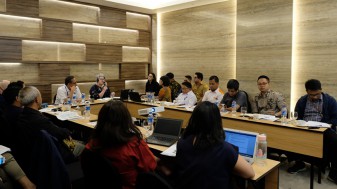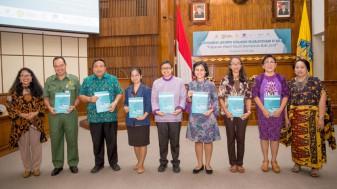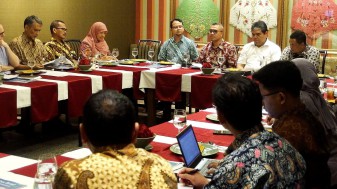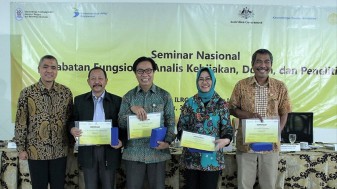A protocol is highly needed to promote the adoption of gender perspective and social inclusion in research. This protocol can serve as an implementing guideline which governs research from the planning, data collection up to the completion phase.
This was revealed in the third session of the discussion: KSI for Research, Development, and Innovation (KSI4RDI) GESI Streamline held online by Knowledge Sector Initiative (KSI) on Tuesday (22/9). KSI4RDI GESI Streamline is a series of discussions held to integrate the perspective of gender equality and social inclusion (GESI) in research, especially in the era of the COVID-19 pandemic. The series of discussions was held in four sessions involving researchers and related stakeholders from academia, government and non-government research institutions.
In this third session of discussion, the main topic was the tools and approaches that were or needed to be made available to promote application of GESI perspective in policies and research programs. Unlike the two previous discussion sessions, there were no speaker in this session. All participants were invited to share their experience with each other when trying to integrate GESI in research. They were divided into two discussion groups, namely the gender lens discussion group facilitated by Abdul Latif Jameel Poverty Action Lab (J-PAL) and the social inclusion lens discussion group for people with disabilities facilitated by Australia-Indonesia Disability Research and Advocacy (AIDRAN) and Legal Aid Institute (LBH) for Disabilities. At the end of the session, participants reconvened in the plenary to share the conclusion of their group to the others.
The need for a research protocol was identified as important in the conclusion of both discussion groups. Christal Setyabudi, Research Associate of J-PAL, the facilitator of the gender discussion group, said that a research protocol and an ethics committee were needed to ensure the integration of gender perspective in research. A clearance from the ethics committee is paramount in each research cycle to ensure ethical compliance, encompassing confidentiality and good data quality as well as proper research practices when collecting data in the field. “During data collection, for example, gender biased questions and comments should be avoided. The research team and enumerators need to learn to identify them," she said.
Apart from discussing the research protocol, this group also talked about the challenges faced in developing programs and research which applied a gender perspective. These challenges included program partners who often did not have gender awareness, which made it difficult to collect data directly, especially during a pandemic. Big data and administrative data were currently an alternative source of data. However, such data were general in nature and not disaggregated by sex.
Aqila Putri, a Senior Research Associate at J-PAL shared her institution's experience in mainstreaming and applying a gender lens in every phase of the program, from the planning phase, intervention design, data collection, to data analysis and communicating the findings. In each of these phases, each researcher needed to think critically to ensure that the program being designed was not gender oblivious. "You do this by understanding the context, analyzing the existing power relations, and considering marginalized women’s knowledge and experience," she explained.
From the social inclusion group for people with disabilities, Slamet Thohari, the Chair of AIDRAN explained that ethical clearance was deemed paramount to research. A research plan should not be allowed to proceed in the absence of such clearance. "If it is a university-based research, usually such committee exists in every university.” Without such clearance, the research will be deemed less valid," he said.
He mentioned that one of the ethical components was the informed consent from the vulnerable groups involved. Related to that, the technical plan of a research had to consider as well the multiple aspects of disability. Thus, accessibility and proper accommodation had to be calculated in the budget planning. "You have to consider the needs of each individual because the conditions may vary from one another," he said.
Also, he underlined the importance of applying a participatory method in inclusive research. The research questions had to be highly and directly relevant for people with disabilities. It is very important to hear their voices directly. Non-disabled parties should not be allowed to speak on their behalf. "So it is necessary to clear the space, provide room for people with disabilities to speak, involve them and allow them to bring in their perspective from the time we establish the research problems," he added.
Hari Kurniawan, Director of LBH Disability, added that research institutions which wished to design inclusive research but were not equipped with staff with disabilities could consult with organizations that focus on disability issues when developing their research plan. This way, the research plan could be carefully developed to ensure its inclusiveness. Furthermore, they could also obtain advice regarding how the data collection should be carried out, especially on the ethics of how to properly interact with disability groups and make sure that they would remain comfortable during the course of the research.
In the closing, KSI Knowledge Exchange Coordinator Noviana stated that the output document would be developed in the form of a compilation of Lesson Learned Stories (LLS) depicting the production of inclusive knowledge using a GESI perspective. This LLS document would contain a brief summary of the main points regarding the learning shared in about 4 discussion sessions. Participants were expected to contribute and share their experiences and knowledge during the streamlined KSI4RDI GESI series by submitting a short piece of writing, consisting up to 2000 words in Indonesian. Further explanation regarding the format and timeline for the development of such document would be discussed in session 4 which would be held at the end of October 2020.
KSI4RDI (KSI for Research, Development and Innovation) is an interactive discussion initiated by the Knowledge Sector Initiative (KSI). The KSI4RDI GESI Streamline discussion activity aims to promote inclusive research in the context of gender equality and social inclusion. The third session of the KSI4RDI # 7 GESI Streamline discussion series brought together researchers / knowledge producers and development program sector actors to exchange knowledge and good practice examples in applying the GESI lens in the research and study cycles.






